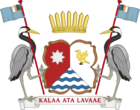Politics of Freice: Difference between revisions
No edit summary |
|||
| Line 5: | Line 5: | ||
==Executive== | ==Executive== | ||
The head of state is the Má'ita, who is the hereditary ruler of the island. Constitutionally, the Má'ita plays an important role in the political process; they have to promulgate all laws to make them valid, summon and dissolve the Representative Council, and appoints members of committees. Although past Má'itas have actively participated in day-to-day politics, recent heads of state have avoided overly-political activities and undertake their functions largely ceremonially. Despite this, Má'itas maintain significantly more power than a constitutional monarch or ceremonial president, with their opinions exerting informal influence over the activities of councillors. | |||
Decision-making in Freice's government is undertaken by committees. Instead of government departments or ministries, power is delegated to a number of committees made up of councillors. These committees are tasked with a specific policy area, with a chair elected amongst them to guide its activities and to represent the committee to the wider Council. Each committee has between four and six councillors, with councillors permitted to sit on (but not chair) multiple committees. | Decision-making in Freice's government is undertaken by committees. Instead of government departments or ministries, power is delegated to a number of committees made up of councillors. These committees are tasked with a specific policy area, with a chair elected amongst them to guide its activities and to represent the committee to the wider Council. Each committee has between four and six councillors, with councillors permitted to sit on (but not chair) multiple committees. | ||
Revision as of 15:48, 5 November 2023
 |
|---|
| This article is part of a series on the politics and government of Freice |
|
The politics of Freice take place within the framework of a unitary mixed-aristocratic republic, whereby political power is shared between democratically elected politicians and an aristocratic class. Executive power is shared between the Má'ita (the head of state) and the government (formally the Executive Committee of the Representative Council), which is headed by an elected councillor. Legislative power is vested in both the government and the Representative Council. The judiciary is independent of the executive and legislative branches.
Freice's idiosyncratic political system, reflecting both long-held traditions of governance and the influence of colonial powers, has been described as "the last stronghold of aristocracy outside of absolute monarchies."
Executive
The head of state is the Má'ita, who is the hereditary ruler of the island. Constitutionally, the Má'ita plays an important role in the political process; they have to promulgate all laws to make them valid, summon and dissolve the Representative Council, and appoints members of committees. Although past Má'itas have actively participated in day-to-day politics, recent heads of state have avoided overly-political activities and undertake their functions largely ceremonially. Despite this, Má'itas maintain significantly more power than a constitutional monarch or ceremonial president, with their opinions exerting informal influence over the activities of councillors.
Decision-making in Freice's government is undertaken by committees. Instead of government departments or ministries, power is delegated to a number of committees made up of councillors. These committees are tasked with a specific policy area, with a chair elected amongst them to guide its activities and to represent the committee to the wider Council. Each committee has between four and six councillors, with councillors permitted to sit on (but not chair) multiple committees.
The current committees are as follows:
- Economy and Finance Committee
- Education, Sport, and Culture Committee
- Employment and Pensions Committee
- Environment, Fisheries, and Resources Committee
- Health and Medical Services Committee
- Home Affairs Committee
The Policy Committee is defined in the constitution as the "principal committee." The Policy Committee is responsible for leading and co-ordinating the work of all committees and the wider Council, developing and promoting the government's policy objectives, and managing the island's foreign affairs. The President of the Policy Committee is widely regarded as the island's chief minister, and it the president who undertakes many of the responsibilities usually attributed to a head of government
Legislature
The legislature of Freice is the Representative Council. The council is a unicameral legislature consisting of 20 councillors with elections occurring every five years under plurality block voting. Citizens aged eighteen years and over are eligible to vote and stand. The Representative Council introduces, debates, and approves general legislation; approves the budget; elects the Policy Committee; and approves nominations for senior positions in the civil service and judiciary. The Council is chaired by a President, who is elected by councillors to preside oer sessions and maintain order for the duration of the legislature.
The Má'ita officially opens each session of the Council in a special ceremony. During this ceremony, the Má'ita announces the government's agenda for the coming year, important events to be held, and matters of significance for councillors and the general public.
See also
Notes
External links
